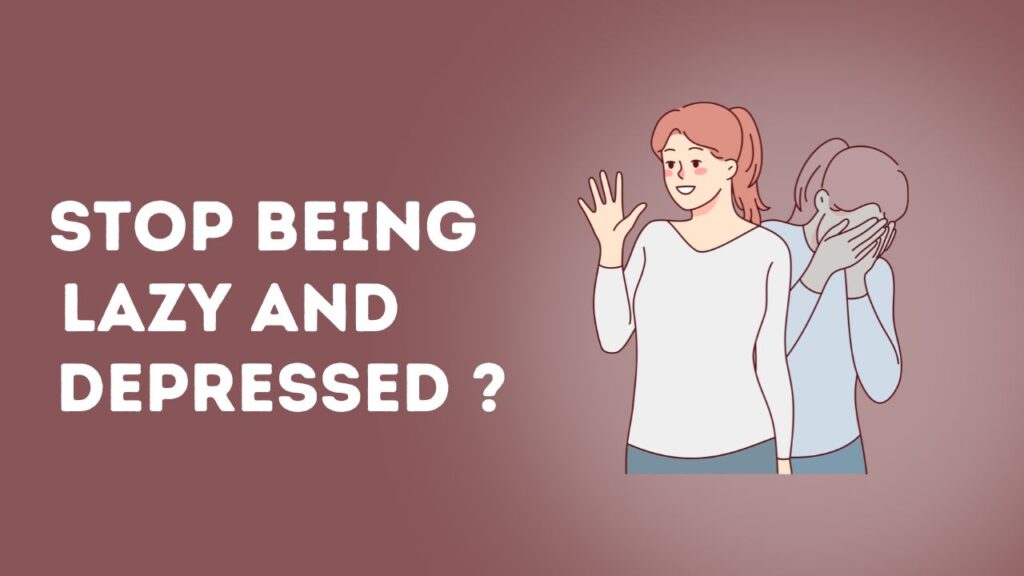How to Stop Being Lazy And Depressed?
To stop being lazy and depressed, make your goals manageable, use positive self-talk, create a plan of action, and recognize your accomplishments along the way. Seek professional help if needed.
Laziness can be caused by a lack of motivation, lack of direction, feeling overwhelmed, or our evolutionary trait of preserving energy.
It is important to differentiate between laziness and depression, as depression is a serious mental illness that requires professional treatment.
Feeling unmotivated and doing the bare minimum may be a sign of depression.
Don’t let laziness drag you down and hinder your productivity.
Take steps to understand the underlying causes and seek appropriate support to overcome laziness and depression.
Understanding Laziness And Depression
Lazy and depressed? Feeling unmotivated and unproductive?
Understanding the causes behind laziness and depression can help you take steps to overcome them.

While laziness and depression are separate conditions, they can often go hand in hand.
Laziness is often associated with a lack of motivation or direction, while depression is a serious mental illness characterized by persistent sadness, hopelessness, and a loss of interest in activities.
Causes Of Laziness
Laziness can have various causes.
Understanding these causes can help you address and overcome this issue:
- Lack of motivation: Sometimes, the lack of a clear goal or purpose can contribute to laziness. Without a meaningful objective, it’s easy to feel unmotivated to take action.
- Overwhelm: Feeling overwhelmed by a long to-do list or a challenging task can make you feel paralyzed and unproductive, leading to laziness.
- Procrastination: Procrastination, a common habit, can lead to laziness. Delaying tasks and constantly putting them off can make it harder to find the motivation to get started.
Causes Of Depression

Depression is a complex condition with various factors contributing to its development.
Some common causes include:
- Genetic predisposition: Certain individuals may have a higher risk of developing depression due to their genetic makeup and family history.
- Chemical imbalance: Imbalances in brain chemicals, such as serotonin and dopamine, can contribute to the development of depression.
- Life events and stress: Experiencing traumatic events, significant life changes, or chronic stress can trigger or exacerbate depressive symptoms.
- Other medical conditions: Certain medical conditions, such as chronic pain, hormonal imbalances, or thyroid disorders, can coexist with or contribute to depression.
It’s important to note that laziness and depression can sometimes overlap or be mistaken for one another.
If you’re unsure whether you’re dealing with laziness or depression, it’s recommended to seek professional help for an accurate diagnosis and appropriate treatment.
Differentiating Laziness From Depression
Distinguishing between laziness and depression is crucial in understanding how to overcome them.
Laziness often results from a lack of motivation or clear direction, while depression is a serious mental illness that requires professional help.
By setting manageable goals, using strengths, seeking support, and taking care of physical health, it is possible to combat both laziness and depression.
Symptoms Of Laziness
Symptoms Of Depression
Overlap Of Symptoms
Differentiating Laziness from Depression When it comes to understanding our emotions and mental states, it’s essential to differentiate between laziness and depression.

While they may seem similar on the surface, each has its distinct set of symptoms.
By understanding these differences, we can better address and manage our emotions.
Symptoms Of Laziness
Laziness is often characterized by a lack of motivation and an inclination to avoid or delay tasks.
Some common symptoms of laziness include:
1. Procrastination: Putting off tasks until the last minute or not doing them at all.
2. Lack of energy: Feeling tired or lethargic even when well-rested.
3. Difficulty initiating tasks: Struggling to get started on projects or activities.
4. Lack of focus: Being easily distracted and finding it challenging to concentrate.
5. Loss of interest: Losing enthusiasm and passion for activities once enjoyed.
6. Short-term thinking: Preferring immediate gratification rather than long-term goals.
Symptoms Of Depression
Depression is a mental health condition that goes beyond normal feelings of sadness.
Recognizing the symptoms of depression is crucial for seeking appropriate help and support.
Some key symptoms of depression include:
1. Persistent sadness: Feeling sad, empty, or tearful for an extended period.
2. Loss of interest: Losing interest or pleasure in activities once enjoyed.
3. Fatigue or low energy: Experiencing a lack of energy and feeling exhausted.
4. Changes in appetite or weight: Significant changes in appetite resulting in weight gain or loss.
5. Sleep disturbances: Experiencing difficulty sleeping or oversleeping.
6. Worthlessness or guilt: Feeling excessive guilt or a sense of worthlessness.
7. Difficulty concentrating: Having trouble focusing, making decisions, or remembering things.
8. Thoughts of death or suicide: Persistent thoughts of death or suicide, or suicidal attempts.
Overlap Of Symptoms
It’s important to note that there can be an overlap of symptoms between laziness and depression.
For example, both laziness and depression can result in a lack of motivation and reduced interest in activities.
This overlap often makes it difficult to differentiate between the two solely based on symptoms.

However, the key difference lies in the duration and severity of these symptoms.
While laziness may be temporary and occasional, depression symptoms persist for an extended period and significantly interfere with daily functioning.
Understanding the subtle differences between laziness and depression is essential in determining the appropriate course of action.
If you find yourself consistently experiencing symptoms of depression, it’s crucial to seek professional help for an accurate diagnosis and appropriate treatment.
Remember, it’s okay to ask for help when needed.
Taking care of your mental health is a priority, and reaching out to a healthcare professional or therapist can provide you with the necessary support to overcome these challenges.
Tips For Overcoming Laziness
Feeling lazy and unmotivated can be a real struggle, but it is possible to break free from this rut and regain your productivity.
By implementing these tips for overcoming laziness, you can start taking small steps towards a more active and fulfilling life.
Setting Manageable Goals
One of the main reasons people often feel lazy is because the goals they set for themselves are overwhelming or too vague.
To combat this, focus on setting manageable goals that are specific and measurable.
Break down your big tasks into smaller, more achievable steps that you can easily tackle.
Positive Self-talk
Our thoughts have a significant impact on our behavior.
Negative self-talk can contribute to feelings of laziness and self-doubt.

Instead of berating yourself for your lack of motivation, practice positive self-talk.
Encourage and motivate yourself by reminding yourself of your capabilities and past accomplishments.
Believe in yourself and your ability to overcome laziness.
Creating A Plan Of Action
Without a clear plan of action, it’s easy to get lost in a sea of procrastination.
Take some time to map out a plan for accomplishing your goals.
Break your tasks into smaller, actionable steps and create a schedule or to-do list to keep yourself organized and accountable.
Having a plan in place will help you stay focused and on track.
Utilizing Strengths
Everyone has their own unique set of strengths and talents.
Leverage your strengths to get things done more efficiently and effortlessly.
If you enjoy working in a group, collaborate with others on projects.
If you’re a visual learner, use visual aids or diagrams to help you understand and remember information
. By playing to your strengths, you’ll find that tasks become more enjoyable and less burdensome.
Celebrating Accomplishments

Don’t forget to celebrate your accomplishments, no matter how small they may seem.
By acknowledging your progress and giving yourself credit for what you’ve achieved, you’ll be more motivated to continue pushing forward.
Treat yourself to a small reward or indulge in an activity you enjoy after completing a task.
Celebrating accomplishments will reinforce positive behavior and help combat feelings of laziness.
Remember, overcoming laziness is a journey, and it won’t happen overnight.
Be patient with yourself and keep implementing these tips consistently.
With time and effort, you’ll be able to break free from laziness and embark on a more productive and fulfilling life.
Strategies For Battling Depression
Learn effective strategies for battling depression and overcoming laziness.
Set manageable goals, practice positive self-talk, create a plan of action, and seek help when needed.
Avoid distractions and recognize your accomplishments along the way.
With determination and support, you can conquer the challenges and regain control of your life.
Depression can make even the simplest tasks feel overwhelming, leaving you feeling unmotivated and stuck.
However, there are strategies you can implement to help you break free from the grip of depression.
These strategies, when combined with determination and persistence, can make a significant difference in your journey towards overcoming depression.
Here are some effective strategies for battling depression that can help you regain control of your life:
Seeking Professional Help
Seeking professional help is a crucial step in battling depression.
A mental health professional, such as a therapist or psychiatrist, can provide you with the necessary guidance and support to navigate through your depressive symptoms.
They have the expertise to help you identify underlying causes of your depression, develop coping mechanisms, and explore treatment options.
Whether through therapy or medication, professional help can give you the tools and resources you need to combat your depression effectively.
Establishing Supportive Relationships
Building supportive relationships can have a profound impact on your battle against depression.
Surrounding yourself with positive and understanding individuals can provide emotional support and encouragement when you need it most.

Consider reaching out to friends, family members, or support groups who can offer a listening ear or share experiences similar to yours.
Engaging in healthy social interactions can help alleviate feelings of loneliness and isolation, and provide a sense of belonging.
Taking Care Of Physical Health
Taking care of your physical health is vital in the fight against depression.
Engaging in regular exercise, eating a balanced diet, and getting sufficient sleep can contribute to overall well-being.
Exercise releases endorphins, which are natural mood boosters, while proper nutrition and rest provide the energy your body and mind need to function optimally.
Prioritizing self-care can promote a sense of vitality and help alleviate depressive symptoms.
Finding Meaning And Purpose
Finding meaning and purpose in your life can help combat feelings of emptiness and despair associated with depression.
Engage in activities that bring you joy and fulfillment, whether it’s pursuing a hobby, volunteering, or setting meaningful goals.
Identifying your passions and aligning your actions with your values can give you a sense of purpose and direction.
By focusing on what truly matters to you, you can cultivate a more positive outlook and regain a sense of control over your life.
Developing Coping Mechanisms
Developing healthy coping mechanisms can provide you with effective tools to manage your depressive symptoms.

This can include practicing relaxation techniques such as deep breathing or meditation to reduce stress, journaling to express and process your emotions, or engaging in creative outlets like art or music therapy.
By exploring different coping mechanisms, you can discover what works best for you and incorporate them into your daily routine to help you navigate through challenging times.
Remember, overcoming depression takes time and effort.
Implementing these strategies and seeking professional help can be powerful steps towards reclaiming your life from the clutches of depression.
With perseverance and a commitment to self-care, you can break free from the chains of depression and embark on a journey towards healing and well-being.
The Importance Of Self-care
When it comes to overcoming laziness and depression, self-care plays a crucial role in restoring motivation, improving mood, and enhancing overall well-being.
Prioritizing self-care activities can provide the necessary support and rejuvenation needed to combat these challenges.
Here are some key areas to focus on:
Prioritizing Sleep
Getting enough sleep is essential for both physical and mental health.
Lack of sleep can contribute to fatigue, poor concentration, and low mood, making it even more difficult to overcome laziness and depression.
Make it a priority to establish a consistent sleep routine, aiming for 7-9 hours of quality sleep each night.
Create a comfortable sleep environment, reduce exposure to screens before bed, and consider incorporating relaxation techniques such as deep breathing or meditation to promote better sleep.
Engaging In Regular Exercise

Regular physical activity has been shown to have significant benefits for mental well-being.
Engaging in exercise releases endorphins, which are natural mood boosters.
Find activities that you enjoy and incorporate them into your daily routine.
Whether it’s going for a brisk walk, practicing yoga, or participating in a team sport, regular exercise can help combat feelings of laziness and depression by increasing energy levels, improving sleep quality, and reducing stress.
Nourishing The Body With A Balanced Diet
A healthy diet provides the necessary nutrients for optimal brain function and mood regulation.
Aim to include a variety of fruits, vegetables, whole grains, lean proteins, and healthy fats in your meals.
Avoid excessive consumption of sugary and processed foods, as they can lead to energy crashes and fluctuations in mood.
Fueling your body with nutritious foods can help improve mental clarity, increase energy levels, and support overall well-being, ultimately helping you combat laziness and depression.
Practicing Mindfulness And Relaxation Techniques
Mindfulness and relaxation techniques can help calm the mind, reduce stress, and promote emotional well-being.
Incorporate activities such as deep breathing exercises, progressive muscle relaxation, or meditation into your daily routine.

These practices can help you become more present in the moment and cultivate a sense of inner peace and relaxation.
By practicing mindfulness, you can better manage negative thoughts and emotions, and improve your ability to overcome laziness and depression.
Frequently Asked Questions On How To Stop Being Lazy And Depressed
How Do I Get Rid Of Extreme Laziness?
To get rid of extreme laziness, follow these tips:
1. Set manageable goals and track your progress.
2. Focus on your strengths and utilize them.
3. Don’t be afraid to ask for help when needed.
4. Take care of your physical health by eating well and exercising.
5. Reward yourself for completing tasks.
6. Seek professional help if necessary. By implementing these strategies, you can overcome laziness and increase your productivity.
How Do I Stop Being Mentally Lazy?
To stop being mentally lazy, follow these steps:
1. Set manageable goals and track your progress.
2. Focus on your strengths and use them to your advantage.
3. Don’t hesitate to ask for help when needed.
4. Maintain a healthy lifestyle through proper nutrition and exercise.
5. Reward yourself for your achievements along the way. Consider seeking professional help if necessary.
Why Am I So Lazy And Unmotivated?
Feeling lazy and unmotivated can have various causes, such as a lack of clear goals or interests, overwhelm, or a natural inclination to conserve energy.
To overcome laziness, set manageable goals, use positive self-talk, create a plan, recognize your strengths, and seek support when needed.
Avoid distractions and celebrate your accomplishments along the way.
Do Depressed People Tend To Be Lazy?
Depression can lead to apparent laziness, but it is not always the case.
Laziness can be a sign of other health conditions or stress and burnout.
Some people with depression experience avolition and lack of motivation.
Faq 1: Why Am I Feeling So Lazy And Unmotivated?
Feeling lazy and unmotivated can happen due to various reasons such as lack of clear direction, interests, or feeling overwhelmed.
Our evolutionary trait also plays a role as we are hardwired to preserve energy.
Faq 2: Is Laziness A Symptom Of Depression?
For some people, laziness may actually be a sign of clinical depression, avolition, or other health conditions.
Procrastination and lack of motivation could also be related to stress or burnout.
Faq 3: How Can I Get Rid Of Extreme Laziness?
To overcome extreme laziness, you can make your goals manageable, use positive self-talk, create a plan of action, recognize your accomplishments, ask for help, and avoid distractions.
Faq 4: How Do I Stop Being Mentally Lazy?
To stop being mentally lazy, you can create manageable goals, utilize your strengths, ask for help, maintain a healthy diet and exercise routine, and reward yourself for your efforts.
Faq 5: Can Laziness Be Overcome With Exercise And A Healthy Lifestyle?
Maintaining a healthy lifestyle, including regular exercise and a balanced diet, can contribute to overcoming laziness as it enhances mood, energy levels, and motivation.
Faq 6: How Can I Differentiate Between Laziness And Depression?
Depression is a serious mental illness, while laziness is a state of lacking motivation. If you are unsure, seek professional help to determine the difference.
Conclusion
To overcome laziness and depression, it is crucial to set manageable goals, use positive self-talk, create an action plan, and recognize your accomplishments along the way.
Utilizing your strengths and seeking help when needed can also greatly contribute to breaking free from these negative cycles.
Avoiding distractions and taking care of your physical and mental health through exercise and proper nutrition are essential.
Remember, laziness can sometimes be a symptom of depression, so it’s crucial to seek professional guidance if needed.
Don’t let laziness and depression hold you back from living a fulfilling life.


